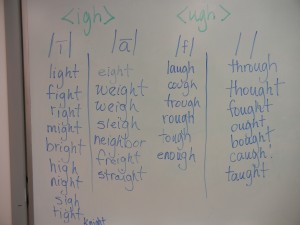A couple weeks back we were talking about trigraphs. I wrote <igh> and <ugh> on the board and we brainstormed words that had those trigraphs in them. Then we further sorted the words with <igh> into two columns. One column contained words with a consonant in front of the <igh>. The second column contained words with either an <a> or an <e> in front of the <igh>. As we read through the words in the first column (with the consonant in front of the <igh>), the students noticed that the <igh> represented long /i/. This list contained words like right, frighten, mighty, and sigh. As we read through the words in the second column (with either an <a> or an <e> in front of the <igh>), the students noticed that the vowel plus the <igh> represented long /a/. This list contained words like eight, neighbor, straight, and freight.
When sorting the words with an <ugh> trigraph, we made one column in which the <ugh> represented /f/. This list contained words like laugh, cough, rough, and tough. The second column had words in which the <ugh> represented no sound at all! This list contained words like though, through, caught, and bought.
Next the students practiced spelling out the words and pronouncing them. The practice helped everyone single out the trigraphs as they spelled. For example, the word <night> was spelled out as <n> <igh> <t>. the word <knight> was spelled out as <kn> <igh> <t>.
When we finished with this activity, someone mentioned that they wished they had known this stuff sooner. I asked, “Are these words you often had trouble with on spelling tests or in written work?” There was a resounding, “YES!” It was at this point that I threw out the suggestion that we offer to present this to some younger students. My fifth graders were very enthusiastic to do this. So I emailed the second grade teachers and asked if they would be interested. They were particularly interested in the <igh> trigraph, so we prepared a lesson and presented it today!
I think the fifth graders were a bit surprised that the second graders enjoyed this so much and caught on so quickly. We left our materials with the second grade students so they could review, practice, and collect more words after we left.
The teachers invited us back to do a lesson on writing out word sums. One of the fifth graders thought we should prepare a lesson on the <-ion> suffix as well. I’m thinking that the third graders might be ready for a lesson on the <ugh> trigraph. Oh! The places we’ll go!

